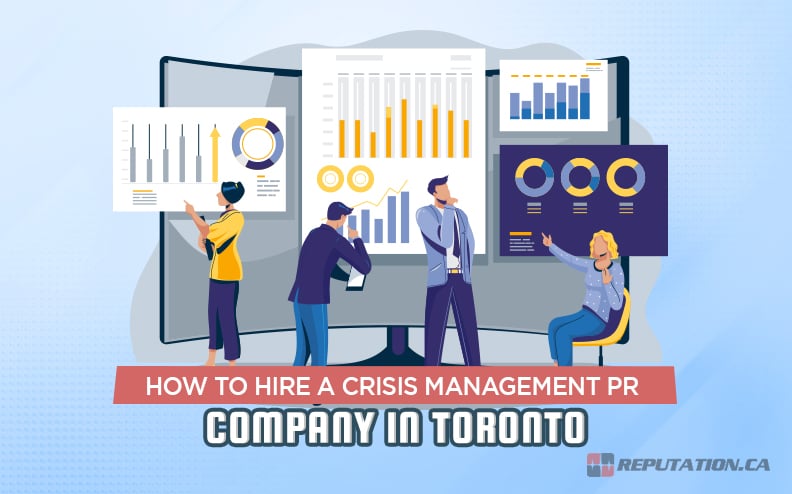When operating a business or managing a public image, there is always a concern that something will impact the public’s perception of you. Every person and company relies on their reputation to succeed in modern society. Unfortunately, reputations are difficult to build and easy to destroy, especially in a world where online communication allows word to travel rapidly.
Within a few hours, your personal and professional reputation can be devastated by a rapidly dispersed comment or review. The longer this information remains available, the more likely you will end up with an unsustainable reputation. Eventually, this degradation of your reputation can reach a crisis point that is impossible to resolve on your own.
A reputational crisis usually involves damage beyond the subject’s ability to repair themselves. Repairing the damage that puts your reputation at a crisis point requires resources and time that you might not be able to spare despite the situation’s urgency. Fortunately, you can use tools to counteract the reputational damage and restore respect to your name or that of your business.
One of the most reliable methods is to retain the services of a public relations company specializing in reputation management and marketing. Hiring such a company can be challenging if you do not know what to look for in one.
What is “Crisis Communication?”
Dealing with a reputational crisis is not as straightforward as you might hope. When something is classified as a “crisis,” those handling the fallout must be versed in crisis communication. Crisis communication is a specialized form of communication focusing on addressing sensitive topics where nuance is important. Crisis communication is not simple and cannot be executed by anyone untrained in the concept. The team responsible for handling crisis communication will also need as much information about the situation as possible.

Crisis communication efforts begin with the team collecting information about the situation, so they are fully informed about what needs to be managed and why. Once they have this data, they can disseminate it to create a response that counters the issue. Crisis communication is especially delicate since one wrong term can exacerbate the issue rather than fix it. The public relations expert must carefully select the responses to avoid a worse outcome than what is already happening. Most crisis communication is limited to major events with global repercussions, but corporate actions are scrutinized similarly.
While crisis communication is meant to be an end-run endeavor, being able to execute a crisis response is a crucial skill. The specialized nature of crisis communication is often too complicated for the average person to execute. Often, your best bet is to look for a public relations firm capable of crisis communication techniques.
Ask the Right Questions
Retaining the services of a company to represent you and your interests requires a lot of information to ensure they will not harm your image more than they help it. It is easy to claim that they are the best choice, but without evidence, it can be difficult to trust them. While your reputation might be reaching a breaking point, hiring the wrong management firm will only accelerate the process rather than correct the issue.
This is why it is critical that you thoroughly vet the companies you are considering as your public relations specialist. Fortunately, you can ask a few questions to ensure they know what they are doing.

The most important questions to ask a public relations firm are:
- Do you have a list of clients for whom you successfully executed a crisis management plan?
- Can you list case studies describing the tools and techniques you used to resolve similar situations for other clients?
- What experience does your firm have with crises involving social media accounts?
- Who will I be coordinating with for the day-to-day operations of the crisis response operation?
- Does your firm write crisis communication plans, and what details factor into their creation?
- What kind of training do you provide, who provides it, and to what extent?
- What percentage of your contribution can be classified as crisis work?
Each of these questions will help provide insight into the quality and skill of the firm you are considering. Concerning the final question, you might want to opt for a firm that dedicates the majority of its efforts to crisis response. However, the amount of effort your crisis response requires will depend on the severity of the issue.
What They Should Not Do
Because of the sensitive nature of crisis communication, there are several mistakes that the public relations expert should never make. One misstep could destroy what goodwill you have left and compromise your future endeavors. While an inexperienced representative might be more likely to make a critical error, a firm dedicated to public relations should have no such shortcomings. This is why you will need to investigate their professional history to ensure they do not usually make those errors.
The most important part of public relations is keeping a cool head even when dealing with highly aggressive commentary. Even if the accusations being levied against you are false, you cannot lash out against the person leaving those comments. When you hire a public relations firm, it is normal to expect them to remain professional and avoid fueling arguments with the public.
This is part of what makes the first few questions from the last section so important. If the firm has a history of being combative with the public, it will only damage your reputation by turning more people against you. When there is an uproar about you or your business, the public wants to be heard, so you might correct the issue that is upsetting them. They want to be respected even when the claims are false or pointless.
If the firm’s representative is going to argue with the public, the firm likely does not maintain the proper professional standards to protect your reputation. While this issue is not likely to affect your search for a firm, especially since a firm would likely fail if they have a record of poor conduct, it must be considered. That said, there is still more to look out for if you do not want to hire a firm whose services will backfire.

Another critical detail regarding crisis management is the timing of your response or that of the public relations firm you hire. Much like the age-old fairy tale Goldilocks, there is a way to respond to a crisis that is “just right” regarding the timing. It is too easy to respond to the drama too late or too quickly and put yourself in a worse position than before. The firm you hire will need to hit this timing sweet spot if it will succeed at protecting your interests.
Replying too late is a very common issue that many companies are guilty of committing. It is not difficult to imagine such an issue affecting modern companies, even if they have a public relations firm on the payroll. An inept firm will be unable to appropriately time the response to ensure it does not arrive too late to make a difference. The longer a crisis is allowed to continue without intervention, the more likely it is to damage your reputation. The real problem that most fail to consider is the ramifications of responding too soon.
It is common to want to nip a crisis in the bud before it is allowed to spread and devastate the foundation of your reputation. Unfortunately, the eagerness to respond to the problem can lead to your response backfiring. This is because the initial wave of discontent does not always specify everything causing the reputational damage. Responding too quickly could lead to your attempts failing to consider all the important details. This can cause your response to land you in hot water since you cannot address the public’s concerns with you or your company.
Ensuring the firm you hire is capable of timing the response properly and hitting the proverbial “Goldilocks” standard is one of the most important determinations you can make. A public relations firm that cannot respond within an appropriate timeframe is not worth hiring and is something you will need to assess through their client history.
An Example of a Public Relations Crisis
There is a fine line between a public relations issue and a full-blown crisis. One can generally be resolved with minimal lasting damage to your reputation, while the other can cause significant distrust for years if you do not address the issue. Crises like this have become far more common in the modern era. However, this is likely a result of the online communication tools that enable rapid dissemination of public discontent. While these crises are becoming more common, a handful have become infamous in modern society.
One of the most well-known public relations disasters occurred in 2016 and became known as the Facebook-Cambridge Analytica data scandal. The scandal involved the creation of an app called This Is Your Digital Life that cooperated with Facebook to organize a survey for allegedly academic purposes. However, Facebook allowed Cambridge to access the data of the Facebook users who completed the survey and that of the people on their friends list. One of the questions on the survey related to the respondents’ political leanings, which allegedly influenced the 2016 presidential election.

During the 2016 presidential race, then-candidate Donald Trump purchased the survey data from Cambridge from September through November. Supposedly, Trump did this to get inside knowledge about the political preferences of American citizens to improve his odds of winning the election, which he ultimately did. When this transaction came to light, Facebook responded to resolve the crisis, but it only worsened the situation.
Facebook’s response to the data scandal attempted to downplay the severity of this infraction and claimed that “something happened” on Facebook’s domain. Facebook coded this statement to absolve themselves of their role in the Trump campaign accessing the private data of thousands of American citizens. Facebook’s insincere apology furthered the declining approval of its website, combined with the growing list of accusations Facebook has faced in the last decade.
This public relations crisis is one of the most significant since it reveals the lack of appreciation Facebook and Cambridge Analytica have for the privacy of American citizens. It also demonstrates a stunning example of how to not address a crisis like this through Facebook’s tone-deaf apology. Facebook’s public relations services are handled internally, but a poorly trained firm could do the same under your company’s name.
Take Your Reputation Back!
Public relations crises can kill a business in less than a week if the underlying cause is not addressed. Reputations take years to build, but one bad interaction can easily destroy them, making reputation management essential to your survival. While creating an in-house team for your public relations needs is possible, hiring a 3rd party firm enables you to focus on your work while the firm handles your public perception. Handing off this much responsibility to an outside group might seem frightening, and it should be since a failure on their part affects you. This is why hiring a firm should include a rigorous vetting process to ensure they are the best for the job.
When considering a public relations firm, your best bet is to use a local business rather than a remote firm across the border. For example, a public relations firm in Texas will not have the pull or resources to coordinate with media outlets in Toronto. To get the best possible experience, you will need a Toronto-based firm since they will have established relationships with these media outlets and will not be affected by time zone changes.

We at Reputation are based in our Toronto office, making us a fully equipped firm with direct access to local resources. Our services include crisis management and public relations efforts, and we will dedicate ourselves to your current needs to ensure top-quality service. Rather than allow a public relations crisis to destroy your business, visit our website and take your reputation back!











